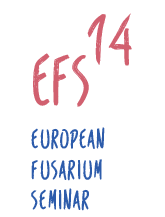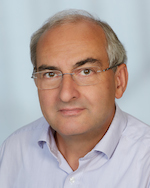
EFS14 - EUROPEAN FUSARIUM SEMINAR
APR. 8 – 11, 2018
TULLN, AUSTRIA

EFS14 - EUROPEAN FUSARIUM SEMINAR
APR. 8 – 11, 2018
TULLN, AUSTRIA
 Dear Fusarium researchers, dear colleagues!
Dear Fusarium researchers, dear colleagues!
As chairman of the local organizing committee it is my pleasure to invite you to attend the
"14th European Fusarium Seminar" which will take place from April 8-11, 2018 in Tulln, Austria. It will be jointly organized by the University of Natural Resources and Life Sciences, Vienna (BOKU) and the Austrian Association of Molecular Life Sciences and Biotechnology, in cooperation with the International Society of Mycotoxicology.
The EFS14 will be an excellent opportunity to present and discuss the progress made in all fields related to Fusarium research, ranging from medical research to plant pathology and from mycotoxin research to mitigation strategies.
In the first session "Fusarium genomics and virulence mechanisms, population genetics and diversity" topics like molecular taxonomy and detection of plant and animal pathogens, climate change or crop related changes in the Fusarium species and chemotype spectrum will be covered. The second session "Host resistance genomics, genetics and plant breeding" will deal with studies about host resistance mechanisms (QTL and association mapping, transcriptomics, etc.), while work with a focus on the chemistry of host-pathogen interaction will be covered in the session "Fusarium secondary metabolites and metabolomics of Fusarium-host plant interactions". The session "Fusarium mycotoxins: toxicology, metabolism and remediation" will present new insights into classical Fusarium mycotoxins and toxin metabolism, but also emerging compounds and interactions of Fusarium metabolites will be included. A strong focus will be on strategies to detoxify and utilize contaminated grain. Last but not least "Integrated Fusarium management" will address topics ranging from forecasting, epidemiology, agronomic practice (including biocontrol and novel control strategies) to avoid Fusarium infection pre-and postharvest, to problems like emerging fungicide resistance. The progress made by the two large EU-funded consortia to develop tools and strategies to minimize health risks and economic impact of Fusarium diseases and mycotoxins will be presented and discussed.
We hope that many colleagues also from other continents will be able to come to the European Fusarium Seminar, to discuss the latest developments regarding the global Fusarium challenge. Prominent keynote and invited speakers have confirmed their attendance. For each session six to seven oral presentations will be selected from submitted abstracts by our session chairs and the international scientific committee. Especially young researchers (Ph.D. students, new group leaders) are encouraged to give oral presentations. In addition, best-poster prizes for each session will be awarded.
The meeting will take place in Tulln, which hosts one of the largest Fusarium research communities working at two different departments of the University of Natural Resources and Life Sciences and in industry. Tulln is located about 35 km (up the Danube) from Vienna, it can be reached from the Vienna Airport by public transportation in one hour. Tulln, a town of about 16.000 inhabitants, has been continuously populated since Roman times. It is close to the Wachau Cultural Landscape. This famous wine growing area is listed as UNESCO World Heritage Site and is also well known for its abundance of apricot trees which are in full bloom in the first half of April. A visit to Wachau is planned as social program before our conference dinner on the last day of the meeting.
Looking forward to welcome you at the 14th European Fusarium Seminar in Tulln,
Gerhard Adam
Fusarium virulence
Host resistance
Metabolomics
Mycotoxins
Fusarium management